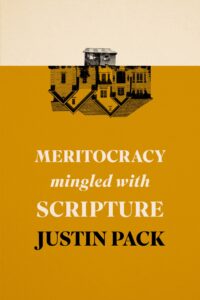 Justin Pack, a philosophy lecturer at California State University at Stanislaus, introduces his new book, Meritocracy Mingled with Scripture, which was published this week by By Common Consent Press.
Justin Pack, a philosophy lecturer at California State University at Stanislaus, introduces his new book, Meritocracy Mingled with Scripture, which was published this week by By Common Consent Press.
I. It was rather rare for us to get referrals in my mission, so we were quite disappointed when it was for a house in a gated community. They wouldn’t let us in. We lingered for a moment at the gate, mulling what to do with extra time on our hands now. This gated community had a golf course and while we watched one of the golfers hit a ball over the wall and it landed with an unusually loud BANG on the other side. “What was that?” we asked the security guard. “Oh, there are people living in tin shacks on the other side of the fence and sometimes when the golf balls go over the fence they land there.”
It was a shanty town made of corrugated tin and cardboard. There were probably 30 people living there. In Mexico City the poor would often build huts that leaned on walls since this helped with stability. The occasional hail of the golf balls of the wealthy just came with the territory.
I was struck by this situation. First, the apt symbolism. But second, that no one—neither the poor nor the rich—seemed in a hurry to alter this situation. I asked the security guard, but he said if the police cleared the area out, people would just return later. So the occasional gun blasting bang of golf balls on corrugated tin shacks was accepted by all, and life went on.
II. Our dear, elderly office manager came back crying from her appointment. Due to health issues her husband has had to retire. He is a pastor and as part of his patronage they provide housing. But now they have to move out and they are looking for a mobile home. Except in the current housing crisis they cannot afford one.
III. The Spanish philosopher Adela Cortina has coined the term “aporophobia” to describe not just the fear of, but also the general disdain and hatred of the poor. She argues that “aporophobia” is akin to racism in the sense that it justifies the immoral treatment of one group due to their supposed inferiority. At some point in the future, she thinks we will look back at our contemporary attitudes and treatment of the poor and see them as hate crimes.
We are surrounded by human beings that are treated as inferiors due to their poverty. Recent news headlines have declared that people working for minimum wage cannot afford rent anywhere in the USA now. Poverty wages are everywhere around us. We have neighborhoods segregated by wealth. This inhumanity is pervasive and yet, it is almost as if no one sees it. We are not physically repulsed by gated communities.
The scriptures are obsessed with these topics: the widow and the orphan, the stranger, fine clothing, large houses, trying to get people to be equal (“if you are not equal in earthly things ye cannot be equal in obtaining heavenly things” DC 78:6), etc. And yet, many of these are simply not discussed. I have never heard housing discussed at church, ever. In probably every ward I have been in, there are some LDS members living in very large, fancy houses and others renting in apartments with no hope of every owning their own home. This isn’t a result of hatred, but an uncritical acceptance of these disparities. Like the shanty towns outside the golf course, no one talks about it.
In Meritocracy Mingled With Scripture, I try to explain the role of meritocracy in justifying the rampant inequality all around us and how in so doing it disappears many of the fundamental moral concerns of the gospel. I claim that meritocracy not only excuses these inequalities but is often taken to imply that they are merited. Since, we are told, we can all succeed if we work hard, the poor must not be working hard enough. And the wealthy with big houses and nice cars deserve them because they must have worked for it. It would be immoral for us to help the poor too much, since ultimately their position is merited. And we should not unfairly take from the rich, since they merit what they have earned.
Not only is this absurd and cruel, I argue it is satanic. The closest thing we have to it in scripture is the anti-Christ Korihor, who pushes the libertarian mantra that: “every man fare[s] in this life according to the management of the creature; therefore every man prosper[s] according to his genius”. Korihor complains that the people can’t do what they want with what they have earned because their church leaders demand they do things like help the widow and the orphan. Sadly, the doctrine of Korihor is now common sense in many places, everything else is “socialism”.
It is not very surprising, then, that grace is very limited in consumer capitalism. By grace, I don’t mean the narrow sense of salvation, but an entire logic of grace that centers on non-calculative gift giving. The logic of gifts is pervasive in the scriptures, and very different from the calculative logic of merit. According to the logic of grace, nothing you own is yours, everything is a gift from God. Your body, your work, the rain, the air, your car, your clothes—all gifts from God. As such, critically, you should not keep your gifts for yourself, but share them with others! To horde the gifts for ourselves, is to deny grace.
Why, if the scriptures are so antithetical to the logic of meritocracy, does it tend to go so unchallenged? My suggestion is that this is due to the theological and explanatory power of meritocracy. It takes all these crude and alarming inequalities and turns them in justice. The world is as it should be and the inequalities that exist are morally correct. This both liberates the rich from the need to care for the poor (get a job!) and the existential anguish of living in such an unjust world, but also, critically, tells those that are well off that they are morally good and upright. They have worked. They have earned it. They deserve what they have. Ironically, the power of the meritocratic vision not only provides moral worth for the successful but offers a vision of potential success to those who have not yet succeeded. The result is the awkward support by some poor for political policies that help the rich—after all, they too will be rich too soon…right?
Meritocracy, then, functions as a theodicy, a defense of God and the world. Instead of having to wait for the next life for God to fix things and restore justice, meritocracy gives us justice now—no need to wait. In case the implications of this claim are not clear, I am arguing meritocracy is a false gospel that has become mingled with the real one and created a disturbing situation in which we tolerate grotesque and unjust inequalities. Meritocracy is antithetical to the gospel, and it has, for the most part, crowded out the divine logic of grace.
We have an image of sitting down on judgement day and being asked “drug, sex and rock and roll?” to which we respond confidently “no, of course not”. I suspect one of the questions will be “why the big house”?
“I earned it” will not be the right answer.
 Justin Pack is a full time lecturer at CSU Stanislaus where he teaches philosophy courses on environmentalism and ethics. Indeed we may say he follows the admonition of Arendt: to think what we are doing and to critique the outstanding characteristic of our time—thoughtlessness. He loves Coastal Redwoods, Giant Sequoias, birds, enchiladas verdes, ancient fortresses and ruins.
Justin Pack is a full time lecturer at CSU Stanislaus where he teaches philosophy courses on environmentalism and ethics. Indeed we may say he follows the admonition of Arendt: to think what we are doing and to critique the outstanding characteristic of our time—thoughtlessness. He loves Coastal Redwoods, Giant Sequoias, birds, enchiladas verdes, ancient fortresses and ruins.
